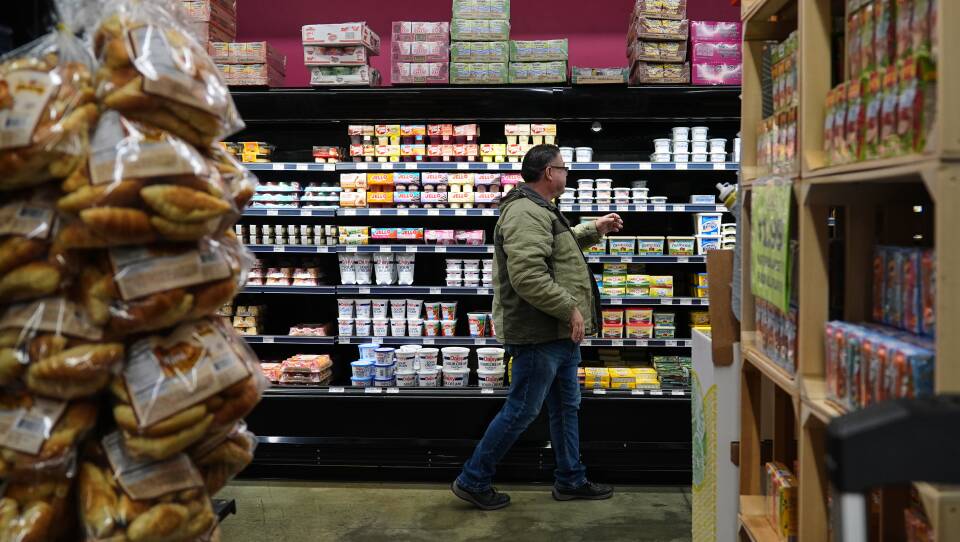Massachusetts Attorney General Andrea Campbell and 21 other attorneys general are suing the Trump administration over cuts and limitations to certain immigrants’ access to the nation’s food assistance program.
In a suit filed in Oregon’s federal district court on Wednesday, plaintiffs said they’re seeking immediate injunctive relief to stop the policy changes from continuing. Campbell said that the move has impacted thousands of people in Massachusetts.
“On the eve of Thanksgiving, a holiday that is about generosity and gratitude, I’m absolutely frustrated and angry that the Trump administration has chosen again to play political games with our residents’ lives, because in many communities, this truly is about life and death,” said Campbell in a press conference about the lawsuit.
The attorneys general argue that the U.S. Department of Agriculture’s memo illegally rewrites long existing rules and threatens to cut off food assistance for people who are eligible under the law. The USDA published a guidance on Oct. 31 that set new restrictions on refugees, people granted asylum and others’ eligibility for SNAP. The restrictions went into effect on Nov. 1.
Under federal law, refugees were eligible for SNAP. Refugees, and some immigrant groups were also allowed to bypass the typical five-year wait period to become eligible for SNAP.
“We will not comment on pending litigation,” said an unnamed spokesperson for the USDA, and directed GBH to the Department of Justice, which didn’t return request for comment.
Prior to the Oct. 31 guidance, the One Big Beautiful Bill Act narrowed the categories of noncitizens who are eligible for SNAP benefits and created a set of penalties tied to state error rates in issuing payments to SNAP beneficiaries.
The Department of Transitional Assistance told GBH News if states don’t comply with the tighter rules on who’s eligible for SNAP, the penalties imposed by Congress “could threaten the state’s ability to serve all clients.” Campbell said her office has been in constant contact with the department.
“They’re concerned about the federal government threatening penalties against our state and agency,” she said. “Their concern [is] about residents — our most vulnerable — who receive SNAP benefits not having access to food resources, especially the day before Thanksgiving.”
She described the ongoing situation playing out between Department of Transitional Assistances and the SNAP recipients it serves as “one of chaos and confusion, which makes their jobs as an agency extremely difficult.”
The impact of the sudden cut is being felt by immigrants on a local level. Campbell’s office said this will impact nearly 10,000 immigrants.
M.N. was scheduled to re-certify her benefits last week in a phone call with the Department of Transitional Assistance. M.N., a refugee from Afghanistan, had been on it for many months. GBH News isn’t using her name due to her fears of deportation and retribution.
But when M.N gave her new address and information, she was told she could no longer have access to the program.
“They said, 'You’re no longer eligible because you’re a refugee — people who have a refugee status are no longer eligible for SNAP.’ Only green card holders are eligible, and only on the condition which they have been in the country for five years,” she recounted as her daughter interpreted from Dari.
But the agency now says those groups of immigrants are categorically “not eligible” for the benefit.
The food assistance benefit is administered through state agencies, such as the Massachusetts Department of Transitional Assistance, but is a federally run program. Most people have to re-certify every six to 12 months to receive benefits. DTA said...
M.N. arrived in the U.S. in October 2024. She fled the Taliban after her husband — a former military officer for the Afghan government supporting the U.S. role there — was kidnapped and disappeared. She lived in Lowell with her daughter, who was also a refugee and now a U.S. citizen, but is now living on her own.
M.N.’s monthly allotment through SNAP was $291 per month. Her inability to use English proficiently has prevented her from finding a job but she’s currently taking classes to improve her language skills.
“The SNAP helped. It at least gave me a month’s groceries, to have food, vegetables on the table to eat — I feel so hopeless and there is nothing I can do except accept what it is,” she said.
International Institute of New England, which is a local refugee resettlement agency, is assisting them in trying to figure out how to appeal M.N’s case to DTA.
“They’re caught in the middle,” said Jeff Thielman, executive director, about the state agency.
“This initial support of SNAP is incredibly important to people as they’re learning English skills, getting jobs, getting settled,” he said. “We’re very concerned about this — refugees are going to be under more financial stress than they already are.”
Plaintiffs also said they had sent letters to the USDA asking them to rescind, correct, and reissue the Oct 31. guidance, but received no response.
“Keenly aware that tens of thousands of lawful permanent residents in Plaintiff States face immediate ineligibility for crucial SNAP benefits and that the States themselves face not only a significant burden in administering the guidance, but also devastating,” the complaint read.





